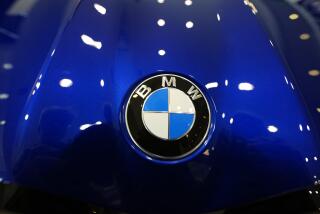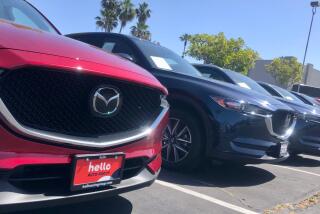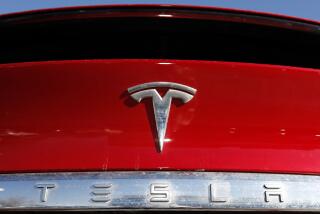Auto recalls speed up, are on track to break a record

General Motors will pay $35 million in a settlement with the federal government over its failure to swiftly report a defective ignition switch in two-and-a-half million smaller cars.
American car owners have been peppered by recall announcements in 2014, as automakers have issued almost 20 million vehicle safety announcements so far this year.
No, the world’s cars aren’t falling apart. But headlines and lawsuits over slow recalls have made auto manufacturers more vigilant.
General Motors Co. announced new recalls Thursday involving 2.7 million cars and trucks sold in the United States — bringing the company’s total for 2014 to more than 11 million vehicles.
The new troubles involve the company’s iconic Corvette sports cars, hulking Silverado pickups, Malibu sedans and luxury Cadillac models.
GM is among a wave of automakers suffering from recall fever. Toyota Motor Corp., the recall leader for the last two years, has recalled almost 3 million vehicles so far this year. The tallies at Ford, Chrysler, Honda and Nissan range from almost 1 million to 1.6 million each.
Even some fancy European brands have caught the bug. BMW recalled 156,000 sports sedans and sport-utility vehicles last month to fix a problem that causes stalls. Mercedes-Benz called back 253,000 C-Class sedans to fix a faulty electrical connection that could shut off taillights and brake lights.
The auto industry has already recalled almost as many vehicles as it did in all of last year and is on track to break the 30.8-million record set in 2004.
Automakers that were slow to recall defective vehicles in the past have been hit with increasingly large federal fines and costly product-liability lawsuits. Meanwhile, the National Highway Traffic Safety Administration faces growing congressional criticism for not forcing car companies to recall vehicles quickly.
“The auto companies are now looking over their shoulders at the exposure to liability, litigation cost and bad publicity,” said Carl Tobias, a law professor and product liability expert at the University of Richmond in Virginia.
This year, Toyota admitted to deceiving regulators about deadly safety defects that caused unintended sudden-acceleration incidents and agreed to pay a $1.2-billion federal fine, the largest penalty ever imposed on an automaker.
GM is the target of regulatory and criminal investigations by the NHTSA, Congress and the Justice Department for waiting more than a decade to recall about 2.6 million cars with an ignition switch issue that has been linked to 13 deaths. The company faces fines that could exceed $1 billion, based on the Toyota settlement, and is dealing with dozens of wrongful death and injury lawsuits filed by product liability attorneys.
“The industry’s calculus for recalls has changed,” said Clarence Ditlow, executive director of the Center for Auto Safety. “If before they were on the cusp of doing a recall, they would look at the cost and say it was too much.”
Now, however, they’re more willing to issue a recall, rather than risk massive fines, criminal charges and a rash of lawsuits — which will make 2014 a record year for recalls, Ditlow said.
It’s not because automakers are turning out more defective vehicles than ever. Rather, Ditlow said, they are being more aggressive about identifying defects, culling through their records and looking at problems with past models in an effort to avoid being the center of the next crisis.
They are also mindful of an army of hungry law firms that make a specialty of going after carmakers, including Hilliard Munoz Gonzales of Corpus Christi, Texas; Beasley, Allen, Crow, Methvin, Portis & Miles of Montgomery, Ala.; and Lieff Cabraser Heimann & Bernstein of San Francisco.
“They know the industry, and they have the expertise, resources, the expert witnesses and network to get into the middle of these cases,” Tobias said.
Efraim Levy, auto industry analyst at S&P Capital IQ, expects the recall numbers to decline in future years as automakers, including GM, work harder to root out defects earlier in the product cycle.
“We think GM quality and design has improved, but that renewed industry proactiveness for recalls and GM’s focus on issues discovered while investigating its ignition problem is triggering the new recalls,” Levy said.
But for now, recalls are on their way up.
“You’re going to see a heightened level of sensitivity. You may see excessive corrective actions,” Sergio Marchionne, the chief executive of Fiat Chrysler Automobiles, said during a forum at Chrysler’s Auburn Hills, Mich., headquarters this month.
GM expects an internal review and reorganization of its recall system will spark more callbacks this year. The company is in the process of hiring 35 new investigators, which will bring its total to about 60, GM spokesman Greg Martin said.
“We are trying to identify issues more quickly so that we could act rapidly and reduce the number of vehicles produced that would have to be fixed,” Martin said.
Consumers should expect to find vehicles produced by GM to have a lower risk of defects in the long term, said Alec Gutierrez, an analyst at auto information company Kelley Blue Book.
The bulk of the recalls GM announced Thursday involve about 2.4 million 2004-12 Chevrolet Malibu, 2004-07 Chevrolet Malibu Maxx, 2005-10 Pontiac G6 and 2007-10 Saturn Auras model cars to fix faulty brake-lamp wiring.
Corrosion in the wiring could prevent brake lights from illuminating when the brakes are applied — or could make them light up when the driver isn’t using the brakes — and could shut off functions including cruise control, traction control, electronic stability control and panic braking assist.
GM said it was aware of several hundred complaints, 13 crashes and two injuries, but no fatalities, resulting from the wire corrosion.
Other vehicles called back by GM on Thursday, for other reasons, include 103,158 older Chevrolet Corvettes 140,067 Chevrolet Malibus from the 2014 model year, 19,225 Cadillac CTS 2013-14 models and 477 full-size trucks from the 2014 and 2015 model years.
GM said it would take an additional $200-million charge against second-quarter earnings to cover the cost of the repairs. That brings the total of its spending on recalls this year to $1.5 billion.







